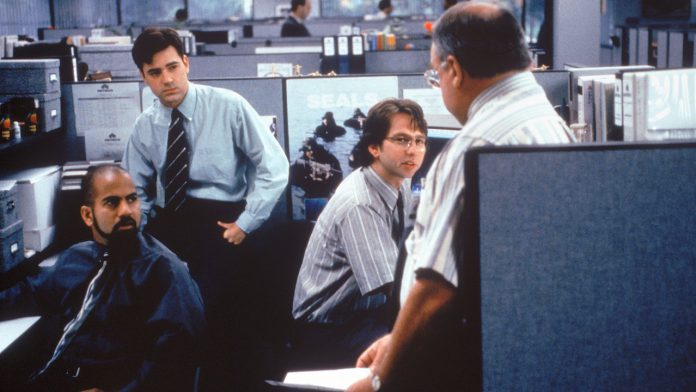heThe first time Mike Judge worked in an office, he lasted three weeks.
While taking time off from college, he landed a job alphabetizing purchase orders through a temp agency. The idea of sitting in an office intrigued him, until he learned the reality of his mind-numbing responsibility. “You’re just alphabetizing all day long,” Judge says. “I’d be home and I’d be alphabetizing in my sleep. This was like water torture.”
After graduating, Judge found more meaningful work as an engineer for a military contractor on Coronado Island, processing schematics for F-18 fighter jets. One day, he stopped by a colleague’s desk to say hello and stumbled into what would eventually become his first animated character. “He just went into this whole thing about how he was going to quit because they moved his desk again,” Judge remembers. “I said, ‘Well, why don’t you want the desk to move?’ It was something about his fish tank: ‘I told Bill, they move it one more time, I’m outta here.’ I remember thinking, they could move your desk 20 more times; you’re not going to quit. He just enjoyed complaining.”
Not long after, in 1991, once Judge committed to pursuing his childhood animation dreams, he took the “bits and pieces of those places” and, using a recently purchased Bolex camera, constructed a short film called Milton’s Office Space. The cartoon, which Judge drew and voiced, centered on an agitated, whining employee and his smarmy, passive-aggressive boss. Comedy Central, a brand-new network at the time, paid him $2,000 for it, beginning Judge’s blistering trajectory as a prolific comedy mind.
The pencil drawing and cubicle experiences eventually inspired Judge’s live-action directorial debut, Office Space. Released 20 years ago this week, the comedy, at first a box office flop, took on cult classic status by holding up a mirror to the depressing, cynical, and occasionally farcical nature of the modern office. The premise, about a software company employee who stops caring about his soul-sucking job, provided catharsis for many who also felt trapped by micromanaging bosses and offered an antidote to their 9-to-5 monotony.
“That’s what we all loved about it—it was a totally authentic view about the horrors of working at an office,” says Daniel Rappaport, one of the movie’s producers.
But turning Judge’s semiautobiographical and hyperspecific vision into a collaborative medium didn’t come without its challenges, battles, and mistakes. Below is the story of how one of the best creators of his generation produced an endlessly relevant world of annoying colleagues, lurking bosses, broken printers, red staplers, “flair,” and the desire to burn it all down.
Part I: “I Think We Have a Real Movie Here.”
Judge’s first animated series, Beavis and Butt-Head, premiered in 1993 on MTV. A ratings hit with an edge, the show made Judge a hot item in Hollywood. Studios came calling with one question: Got any ideas for a movie?
Daniel Rappaport (producer): Beavis and Butt-Head had exploded. Everybody wanted to be in business with him.
Mike Judge (writer, director): The Aspen Comedy Festival played a bunch of my stuff, including my original animated shorts. That’s where [Fox Network president] Peter Chernin saw the Milton short—at that point, I had done three more for Saturday Night Live—and said, “This should be a movie.” I think he was thinking of a Walter Mitty–type thing. I was in the process of writing the King of the Hill pilot and doing the drawings and then they said, “Let’s get some writers to come in and pitch.” I didn’t see a whole movie in Milton; I wasn’t sure how to do that. To me, he was somebody that I kind of didn’t want to know what he does when he goes home.
Sanford Panitch (executive vice president at 20th Century Fox, current president of Columbia Pictures): We all recognized there was something special in Mike’s voice. Honestly, you just laughed out loud when you talked to him about his ideas and about where his inspiration came from.
Rappaport: There was no issue with any studio betting on Mike at that point. He could go in and pretty much pitch anything to anyone and we’d probably sell it.
Judge: Fox said, “What if it was a workplace comedy, like Car Wash and it’s an ensemble?” I had been wanting to do something about engineers since I started. Once they said that, then I said, “I can do this myself and I’ll try writing this.” I wrote up a treatment really early in 1996, turned it in to Fox, they really liked it a lot, and then I started one of the busiest years of my life where I was doing the Beavis and Butt-Head movie, then King of the Hill. I started writing the screenplay the summer of 1997.
Panitch: The script was really rough. For me, the awakening was when I would fly down to Austin where Mike lived and we would just sit around with his instruments—he’s actually a talented musician—and he would just tell me more of the stuff that would happen in workplace environments.
David Herman (Michael Bolton): Mike and I and Stephen Root had all worked together on King of the Hill. The person who was casting the pilot for King of the Hill had also done MADtv, so they knew I was able to do diverse stuff.
Stephen Root (Milton): [Judge] had told us he was writing [a script]. But the first time we really heard about it was when he wanted to do the table read for Fox. He said, “We’ll all go over in a group and read it to them.”
Judge: That would have been in September of 1997. We had a bunch of actors come in just to sort of see how it reads as a movie. The only ones who were actually in the movie were Stephen and David.
Root: It was a fairly big meeting for him. Not for us. We had a job we were happy with, but we were happy to go help him.
Judge: I was going to read the voice of Milton, because I had done the voice in the cartoon. Stephen was going to do a bunch of other little parts like the hypnotist, because him and David on King of the Hill had both done a hundred characters. They’re both incredible. At the last minute I started to get cold feet about reading Milton. I wanted to just sit back and listen and not be a part of it, and I just had this epiphany: “Stephen Root, of course”; that’s who should do it.
Root: I went, “Thanks for the prep.”
Judge: He was sitting there looking at the tape, concentrating, and I could kind of hear him start to do it, and I said, “Yes this is great, can you do it?” He just killed it at the table read.
Root: I wanted to grab it more and give it more of a lisp because that’s what I felt it needed. We had no illusions of doing the movie. I actually had a fantastic time doing the psychiatrist. I had the entire room believing I was dying of a heart attack. I think that was my best performance of the day.
Judge: I did imagine David Herman playing Michael Bolton the whole time I was writing it.
Herman: I think what he had seen me play on King of the Hill was a weenie desperately trying to be a man. I think Michael Bolton, what I attached to at his core, is he really is this quashed peon who is trying to maintain his manhood, living in this quiet desperation, trying to still be like, “No, I’m tough, I’m a rapper, I’m a marine.”
Judge: Dave was great. Other people were all right. But I thought it went horribly. The guy who read the lead didn’t quite get it, really. He wasn’t doing it the way I saw it in my head at all. After that read, I just thought, “This isn’t going to work at all—I guess we’re not making this movie.” But then [Fox Film Group president] Tom Rothman was surprisingly positive. [He] was like, “No, the actors weren’t right, but I think we have a real movie here.” I kind of thought, “Well, if you say so.” [Tom Rothman declined to be interviewed.]
Root: I was like, “Well shit, now I’d like to do it.” Mike liked me for it. I had to go through the machinations and go through an audition. He said, “I want you for this, but you’re not a name and it’s a fairly important part.” That’s fine, I do that every day.
Judge: The studio made Stephen come back and read three times. They really wanted to try and get some big star in that role, so I just waited them out.




























